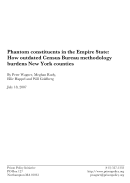
Importing Constituents:
Prisoners and Political Clout in Wisconsin
By John Hejduk and Peter Wagner
Prison Policy Initiative
March 2008
Section:
III. Redistricting and “One Person, One Vote”
III. B. Diluting votes on the local level
Be sure to read the Redistricting and One Person One Vote introduction to this section where John and I explain why federal and state law consider districts of equal population to be so important.—Peter Wagner
Counting prisoners as residents of the voting districts in which they are incarcerated does serious damage to county government and rural democracy. The fundamental inaccuracies of the data create a difficult situation for county officials. If counties rely on the data, the districts will be drawn unfairly. Dodge and Jackson are two counties that took two different approaches to this situation, but they are by no means the only Wisconsin counties facing considerable difficulty because of the Census methodology.
In Dodge County, each district is supposed to contain 2,208 people. Dodge County relied on Census data during redistricting to draw properly-sized districts. But the county contains three large prisons, each of which holds more than 1,200 people. Because the Census numbers included prison populations, more than half of the population in three districts is made up of prisoners. As a result, every resident in districts 8, 29 and 31 has twice the political power of residents of other districts.
Jackson County drew complicated districts that split a prison into four parts to alleviate the problem, but even this was insufficient to avoid serious vote dilution. A district in Jackson County is supposed to contain 1,005 people, but the Jackson Correctional Institution contains 953 people. As the County Clerk explained, a district with so few eligible voters is unlikely to produce any candidates, so the county attempted to reduce the prison’s impact by dividing it equally between four districts. The prison is so large, however, that 24% of the population of each of these districts is prisoners. Every group of 76 residents in these 4 districts has as much of a say over county affairs as 100 residents elsewhere.
Many other counties and small cities with prisons in Wisconsin are similarly affected. Table 2 summarizes the impact of relying on Census data in 12 Wisconsin counties and cities.
| County District | Percent of district’s population that is in prison | Resulting Vote Distortion |
|---|---|---|
| Adams 5 & 6 | 64% | 9 votes here = 25 elsewhere |
| Brown 14 | 22% | 39 votes here = 50 elsewhere |
| Dane 33 | 6% | 47 votes here = 50 elsewhere |
| Dodge 29 | 53% | 47 votes here = 100 elsewhere |
| Dodge 31 | 59% | 41 votes here = 100 elsewhere |
| Dodge 35 | 10% | 9 votes here = 10 elsewhere |
| Dodge 8 | 54% | 23 votes here = 50 elsewhere |
| Fond du Lac 36 | 37% | 63 votes here = 100 elsewhere |
| Jackson 10, 11, 12 and 19 | 24% | 19 votes here = 25 elsewhere |
| Racine 13 | 17% | 83 votes here = 100 elsewhere |
| Sheboygan 22 | 6% | 47 votes here = 50 elsewhere |
| Sheboygan 32 | 25% | 3 votes here = 4 elsewhere |
| Winnebago 12 | 42% | 58 votes here = 100 elsewhere |
| Winnebago 30 | 16% | 21 votes here = 25 elsewhere |
| City District | ||
| Fitchburg City 4 | 14% | 43 votes here = 50 elsewhere |
| Franklin City 1 | 38% | 31 votes here = 50 elsewhere |
| Waupun City 2 | 63% | 37 votes here = 100 elsewhere |
| Waupun City 3 | 79% | 21 votes here = 100 elsewhere |
The Census Bureau’s decision to count people in prison as if they were residents of the prison creates a serious vote dilution problem in Wisconsin cities and counties with prisons. Since even the counties that draw complicated districts to divide the prisons have been unable to eliminate the problem, it is clear that the data must be fixed before redistricting begins.
Footnotes
[17] We also looked at Oshkosh City in Winnebago Co., Fond du Lac City in Fond Du Lac Co., Allouez Village in Brown Co., and Sturtevant Village in Racine Co., but these cities and villages are not affected because their local government is elected at large rather than from districts. The Census Bureau counted the Federal Oxford prison in Marquette County, but as the actual location of the prison is in Adams County, Marquette County did not include the prison in its districts.
Events
- August 5, 2024:
On Wednesday, August 5, 2024, at 3 PM EST, we’ll host a panel of advocates to discuss the importance and challenges of helping people in prison testify at legislative hearings, and introduce our new legislative testimony toolkit.
Panelists include: Anthony Blakenship of Civil Survival, Jesse White of Prisoners’ Legal Services of Massachusetts, and incarcerated journalist Christopher Blackwell.
Register here.
Not near you?
Invite us to your city, college or organization.



